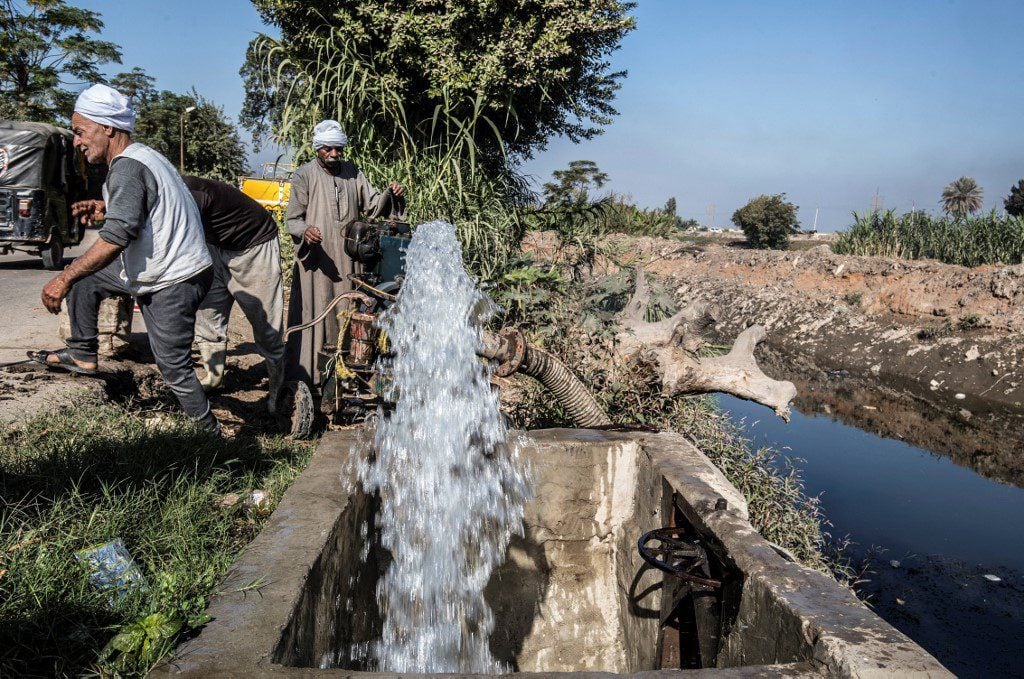
By: Mat Nashed
President Abdel Fatah Al Sisi is struggling to pull Egyptians out of water poverty. According to the U.N, the standard poverty line is an annual share of less than 1,000 cubic meters per person. However, Egypt has a share of less than 600 cubic meters per person.
The water crisis is arguably the largest concern for Sisi’s regime. The agriculture sector, after all, composes about a quarter of the country’s gross domestic product. To preserve that sector, the government is encouraging farmers to save water by adopting to drip irrigation methods. Experts and officials say that method of farming is more sustainable than irrigation by inundation, an old-fashioned method that consists of watering the entire surface of the field. Convincing farmers to make the switch is an ongoing challenge.
“We know that they need to see successful models of implementation and the increased revenue they provide,” said Alaa Azouz, Egypt’s outreach at the agriculture ministry.
The high birth rate is another major issue related to water security. In Egypt, the population is growing by two percent per year, while climate change threatens to reduce the amount of water streaming down from the Nile. That equation could destabilize the country and lead to unrest. “We won’t feel the impact of public spending on national projects and infrastructure unless annual population growth is cut from 2.4 million to 400,000,” Sisi warned last month.
But Sisi’s biggest concern is that Ethiopia’s Grand Renaissance Dam (GERD) will negatively impact Egypt’s share of Nile water. Ethiopia is counting on the GERD to produce more than twice as much as its current electricity output, which is necessary to raise its citizens out of poverty and become a major economic player in the horn of Africa.
After first opposing the dam, Egypt eventually accepted its inevitability. However, Cairo doesn’t want the reservoir to fill too quickly to ensure enough water flows downstream. Sisi wants to see the dam gradually filled over a period of 12 to 21 years, with a possible extension if Egypt faces consecutive droughts. However, Ethiopia insists to fill the reservoir in the next six years.
The stakes are high for both countries, yet some studies predict that filling the reservoir too fast could cut Egypt’s water supply in half.
As tensions build, Egypt, Ethiopia, and Sudan – which will also be impacted by the dam – have tried to reach a compromise. There was an apparent breakthrough when they signed the Declaration of Principles in March 2015. The agreement stipulated that experts would conduct an environment and social impact assessment (ESIA), which international law mandates for any project of this magnitude. However, Ethiopia later claimed that the DoP infringed on its sovereignty and canceled the agreement.
Egypt has since appealed to the U.S for help. Former U.S President Donald Trump warned that Cairo could bomb the dam if Ethiopia didn’t compromise. Experts criticized the threat for exacerbating tensions between the two nations.
Biden’s approach appears more favourable to Ethiopia. His administration announced that the resumption of aid programs to Ethiopia wouldn’t be linked to the Nile dam dispute. Biden’s conciliatory approach could convince Ethiopia that Washington is a neutral mediator.
Either way, Egypt is looking for global partners to diversify its water supply. Enter Moscow, which is cooperating with the Arab Organization for Industrialization and Egypt’s armed forces to promote seawater desalination. The head of the AOI, Abdul Menhem al-Toras, stated that the aim of the cooperation with Moscow is to ensure that Egypt has the necessary tools to build a seawater desalination plant. Russia also stands to gain by strengthening its partnership with Arab regimes by helping them address issues of existential importance.
Osama Salam, a water expert at the Environment Agency in Abu Dhabi, told Al-Monitor that Egypt should be commended for investing in unconventional water resources. “It would be a great achievement if Egypt can manage to desalinate seawater to cater to the needs of the coastal governorates and cover the future demand for drinking water,” he said.
To achieve that quest, Egypt is also soliciting help from Kuwait. In September 2019, Sisi issued Decree No. 83 to acquire a $49.5 million loan from the tiny Gulf nation. Egypt will use the money to build four seawater desalination stations in the south Sinai governorate.
Despite these promising projects, Mohammed Nasreddin Allam, a former Egyptian minister of water resources and irrigation, told reporters that desalination won’t remedy the country’s water deficit. At best, they will provide drinking water to residents living in newly built cities or along the coast.
An agreement on the Nile is thus imperative. Egypt and Sudan recently requested assistance from the global community to revive talks with Ethiopia, which intends to fill the dam with more water this year. International mediation would take the form of a quartet that includes the Democratic Republic of Congo, which currently heads the African Union, the U.N, U.S and EU.
Cairo could resort to force if diplomacy fails. Egypt’s military has already conducted joint exercises with the Sudanese Armed Forces. Sisi has also warned Ethiopia against “extending control over the Nile through unilateral action.” With Ethiopia entrenched in a civil war, President Abiy may have to bend to regional pressure and pause filling the dam. He could also double down by arousing nationalist sentiment among his divided population.
Time will tell if the water dispute spills blood.


